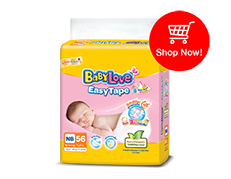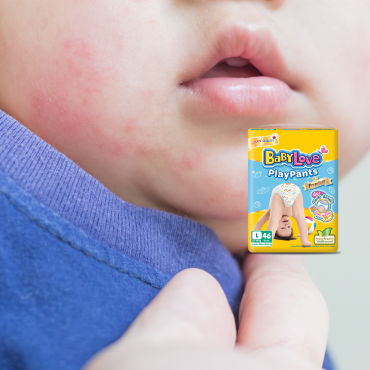The first 3 months after being born into this world is considered a "period of adjustment" that many mothers have mixed feelings about fun, excitement, rewarding feeling, disappointment, disheartedness, frustration, panic, and tiredness. However, all of these feelings are grounded in love and good intentions, which are important to help mothers and children adjust and grow together every day.
The special thing about raising a baby during the first 1-3 months is that the baby's body is not yet complete in its developments. There are many details to be careful and extra caring about. Here are some tips concerning infants 1-3 months old to help mothers get to know the nature of the little ones better and to best adapt to their needs.
Eating
During the first 3 months, the infant needs extra feedings because the size of the stomach is small, only allowing a small amount of milk consumption each time. Therefore, the infant becomes full very easily, but becomes hungry again pretty soon. The frequency of breastfeeding may vary from once every 1 to 3 hours (varies between infants). The feeding schedule is usually associated with the sleeping schedule. Infants usually fall asleep after feedings and wake up when hungry. The more they grow, the more milk they can drink, which results in longer sleeping hours.
Defecating
Many new mothers are shocked that infants in this period have liquid stool, which often looks like diarrhea in adults. However, this is normal for the infant in this age and it is not a diarrhea. It's because the digestive system of the infant cannot functioning properly yet. Therefore, the infant defecates every time after being fed. The frequency of defecating can be used to evaluate whether the newborn is being well fed, especially for those who are breastfed since it is impossible to gauge how much the baby has consumed. Therefore, pediatricians use the number of times an infant defecates to determine whether they are taking in enough milk. (probably up to 8-10 times / day). As the infant’s body grows, the frequency of defecation will gradually decrease until the infant is able to defecate once, from the age of about 1 month.
Hiccupping
Newborns usually hiccup every time after being fed. This hiccup will subside in a short period of time and is a natural symptom caused by the diaphragm muscles’ not being fully developed yet. Parents do not need to make the infant drink water to stop the hiccups because that may make my baby’s stomach too full.
Spitting Up
Another thing that new mothers are often shocked about is when infants spit up milk. This is not caused by serious disorders or illness of the body. It is caused by the sphincter of the stomach not being fully developed yet. Therefore, it is not tight enough to completely prevent the backflow of milk. What parents should do is after the feeding, position the infant’s body so that the head in an elevated position for a while before letting the infant lie down. This can help reduce spitting up. After 6 months, the sphincter of the stomach will gradually begin to work better.
Crackling sounds in the airway
When mothers hear a crackling sound in the infant’s nose, this is most likely residual mucus in the nasal cavity. A 0.9% saline solution can be used for a nasal wash to clear nasal passages. This may help reduce or eradicate the crackling sound. However, if you are not sure or do not know how to use the saline solution, you should consult the pediatrician before attempting to clear the infant’s nasal passage by yourself.
Delicate Skin
Newborns’ skin is often delicate, sensitive to chemicals, or even to stool and urine. It is easily irritated, causing frequent rashes on the skin. Mothers should pay attention to the care and selection of products suitable for the infant's skin, such as not to use water that is too hot to bathe the infant. Parents should also choose to use laundry products or gentle soap that is specifically made for the skin of a newborn. Avoid swaddling the baby with thick fabrics in hot weather. Change diapers immediately after defecation or urination to prevent dampness and bacteria growth. Most importantly, choose a disposable baby diaper that has a soft surface, is free of chemicals, and tested to be hypo-allergenic and not cause allergic reactions.
Rashes in infants
In the first 3 months after birth, newborns are more likely to develop rashes, such as erythema toxicum, red rash of the sebaceous glands, and lymphatic rash in the eyebrow, ear, and scalp area. The symptoms of these rashes will start to improve after your infant's body gets stronger (after about 3 months). You can take care of your baby's skin by ensuring that there isn’t anything in the infant’s immediate environment that causes rashes. Do not swaddle the infant with fabric that is too thick. Do not use products that are inappropriate for the infant’s age, which contain chemicals that can cause allergic reactions. If dirty diapers are left on for too long, the infant’s bottom can come into contact with urine and stool for a prolonged period of time. To treat these symptoms, a specialist should be consulted to determine the cause and the appropriate treatment.
Source: Dr. Anne – Piyarat Lertbunpong (MD) Pediatrician Specialist From Samitivej Hospital, Sukhumvit
Crated At 24/11/2016





















